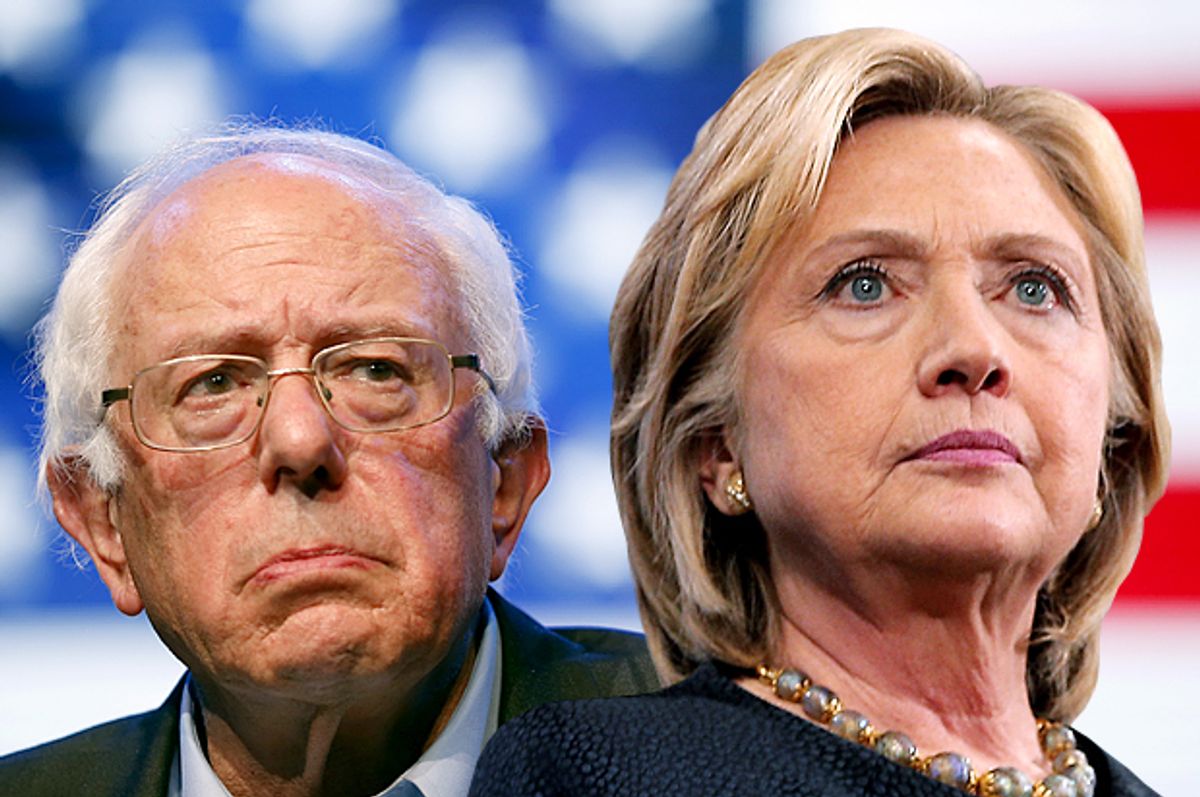Hillary Clinton has already used Bernie Sanders' comments about gun control to cynically accuse him of sexism. Now, she's using his comments on gun control to imply that he's a racist.
“There are some who say that this [gun violence] is an urban problem," Clinton said on Friday, speaking to the Charleston, South Carolina NAACP, in a clear reference to Sanders. "Sometimes what they mean by that is: It’s a black problem. But it’s not. It’s not black, it’s not urban. It’s a deep, profound challenge to who we are.”
Clinton running an ad highlighting her support for gun control is politically smart given Sanders' idiosyncratic record on the issue. But her willingness to smear a left-wing opponent is cynical and particularly remarkable coming from a candidate who has supported some of the most anti-black political initiatives of the past three decades.
Hillary Clinton embraced welfare reform, a major assault on poor people in general and poor black women in particular, and she brazenly stoked racist prejudice during her losing race in 2008 against Obama. She is also a very recent convert to the idea that the system of mass incarceration erected by her husband's administration is a racist disaster (and something, as I will explore in my next story, that gun control measures often abet).
In 1998, she praised the 1994 crime bill for combining "tough prosecution measures with smart prevention efforts" and called for "zero tolerance for guns and drugs in school."
“There is something wrong when a crime bill takes six years to work its way through Congress and the average criminal serves only four," Hillary Clinton said in 1994, the year the bill was passed, employing stop-criminal-coddling language typical of the law-and-order set.
She went on:
"We need more police. We need more and tougher prison sentences for repeat offenders. We need more prisons to keep violent offenders for as long as it takes to keep them off the streets...We will be able to say, loudly and clearly, that for repeat, violent, criminal offenders — three strikes and you’re out. We are tired of putting you back in through the revolving door.”
Bill Clinton's tough-on-crime agenda, as Andrew Cohen wrote, included "a federal 'three strikes' policy, and a broadening of the categories of crimes eligible for the federal death penalty. There also were new hurdles imposed upon capital appeals, making it more likely that innocent men would languish for decades on death row."
Under Bill Clinton, the number of people incarcerated nationwide continued its explosion, and the population of federal prisons rose from 83,669 in 1995, to 131,739 in 2000, to 192,663 in 2014, according to the Sentencing Project.
As late 2008, Clinton staffers pointed to Obama's criticism of mandatory minimum sentences to suggest that he was too liberal. And Clinton still supports the death penalty, something she quietly clarified in October after what Politifact describes as 15 years of obfuscatory silence. Someone may have advised her that it would be one too many issues to "evolve" on all of a sudden. There is, after all, so much to evolve about.
According to the Marshall Project, Bill Clinton's law-and-order record, which Hillary Clinton embraced and owned, included:
"harsher sentencing guidelines; $9.7 billion in new funding for the construction of prisons; $10.8 billion for 100,000 new police officers; more federal crimes punishable by the death penalty; the end of higher-education grants for prisoners; the exclusion of drug offenders from food stamps and welfare; encouragement to states to try more children as adults; the distribution of surplus military equipment to local police departments; and time limits on death-penalty appeals."
Sanders also voted for the 1994 bill, he has said, because it included the Violence Against Women Act. And his support opens him to legitimate criticism. But at the same time, he did not embrace the same law-and-order rhetoric. To the contrary, he specifically condemned tough-on-crime legislation as disproportionately punishing poor and black people and ignoring root causes of crime like poverty.
"This is not a crime prevention bill," he stated in a 1991 House speech condemning a similar bill. He continued:
"This is a punishment bill. A retribution bill. A vengeance bill...We have the highest percentage of people in America in jail per capita of any industrialized nation on earth...What do we have to do, put half the country behind bars?...Instead of talking about punishment and vengeance let us have the courage to talk about the real issue. How do we get to the root causes of crime? How do we stop crime?...Let's demand that every man, woman, and child in this country have a decent opportunity and a decent standard of living. Let's not keep putting poor people into jail and disproportionately punishing blacks."
There is an odd notion that Hillary cannot be held to account for any of the Clinton Administration's policies, even those, like welfare reform, that she has consistently supported in her own words. A woman is not her husband's property and she should not be judged in reference to him. But it's hard to take this argument seriously when you were a policymaking First Lady who publicly backed the positions in question.
At the end of the day, some Clinton partisans don't want her to have to answer for Clintonism, whether the subject be welfare reform, mass incarceration, free trade or Wall Street bonhomie. Rather, she wants to embrace Bill and the halcyon aura of his administration when it suits her and duck questions about his administration’s conservative bent when convenient.
It's healthy that Democrats are finally having an argument about the future of their party and the country. Both sides should get a fair hearing, and their records should be scrutinized. Clinton now seems interested in making baseless smears a central feature of her campaign. Allowing her to do so will only further obscure the debate.


Shares